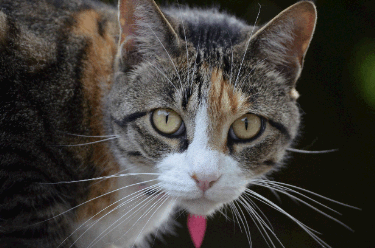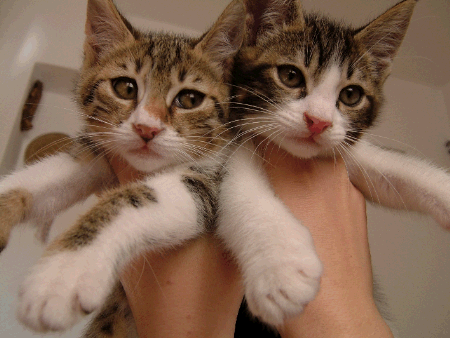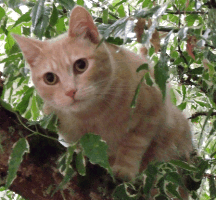|
OWNING AN (FIV+) CAT

|
WHAT IS FIV?
“FIV” stands for “feline immunodeficiency virus” just as “HIV” stands for “human immunodeficiency virus.” In fact, these two viruses are closely related and much of the general information that has become common knowledge for HIV also holds true for FIV. FIV is a virus that causes AIDS in cats; however, there is a long asymptomatic period before AIDS occurs and our job is to prolong this asymptomatic period.
|

(Photocredit: Morguefile.com)
|
For a lengthy description of this virus, we recommend the Cornell Feline Health Center Web site at:
www.vet.cornell.edu/departments-centers-and-institutes/cornell-feline-health-center/health-information/feline-health-topics/feline-immunodeficiency-virus
Also helpful is the IDEXX sponsored site at:
www.pethealthnetwork.com/cat-health/cat-diseases-conditions-a-z/your-cat-felv-and-fiv-retroviruses-101
|
Life expectancy of the FIV + cat is variable. Approximately 18% die within
5 years of infection. An additional 18% are still alive in that time frame
but are experiencing illness from their immune-suppressed state.
The remaining cats appear normal in that time frame and many
go on to live long lives only periodically experiencing illness.
|
|
HOW IS DIAGNOSIS MADE?
Most of the time FIV infection is discovered using a screening test performed in your vet’s office or on a blood panel run at your veterinarian’s reference laboratory. Once a cat has been identified as positive by a screening test, it is best to confirm with an additional test of a different type, such as a PCR test or Western Blot test to add an extra degree of certainty to the diagnosis.
|
In a household with multiple cats, it is important to test all the cats when one cat comes up FIV+ as it is important to know who is infected and who is not. Cats that test negative should be tested annually as they are at higher risk for infection even though, it is generally considered unnecessary to isolate the negative and positive cats from each other. Knowing a cat's status tells you which cats need to follow the guidelines listed in this page.
|
|
It should be noted that administration of the FIV vaccine will cause a cat to test positive on both of the above tests. PCR testing is generally not used for screening but is able to detect viral DNA. It can be used to distinguish an FIV infected cat from an FIV vaccinated cat. The FIV vaccine has been withdrawn from the U.S./Canadian market, not for safety reasons but because it has never been widely embraced by the veterinary profession because of the testing ambiguity situation.

(Photocredit: Morguefile.com)
TESTING KITTENS
While screening a new kitten for Feline Leukemia Virus and FIV is consider crucial to the adoption process, it is important understand what a positive FIV test means in a kitten under 6 months of age. Testing is generally done on a new kitten either before adoption or shortly after. The in-house test takes about 15 minutes to run and the FIV portion of the test is a test for FIV antibodies. The mother cat with FIV rarely transfer the virus to her kittens but she most certainly will transfer her antibodies (usually during nursing). This means that a positive FIV test in a kitten most likely indicates that the mother was FIV+. It will take some time for transferred antibodies to wane so a positive test in a kitten flags the kitten for testing later on (usually around age 6 months or after). After this period, the kitten should be retested. Most kittens will revert to a negative status after their mother's transferred antibodies have worn off.
HOW DID MY CAT GET INFECTED?
The major route of virus transmission is by the deep bite wounds that occur during fighting. There are other means of spreading the virus but they are less common.. FIV can be transmitted sexually and via improperly screened blood transfusions. Casual contact such as sharing food bowls, or snuggling is very unlikely to be associated with transmission. As mentioned, infected mother cats do not readily transmit the virus to their kittens. Mother to kitten transmission requires the mother to be an early stage of her own infection in order to transmit the virus. Kittens testing positive for FIV generally will revert to negative once their mother's antibodies wear off.
Isolation of an FIV+ cat is not necessary in a stable household
unless the FIV+ cat is likely to fight with the other residents.
That said, it is important not to introduce any new cats as
this is likely to lead to fighting and consequent virus transmission.
WHAT DO I DO NOW?
Some lifestyle changes will probably be needed now that you know you have an FIV+ cat.
- KEEP YOUR CAT INDOORS ONLY
Now that you know your cat has an infectious disease, the responsible thing is to prevent the spread of this disease in your community. This means that your cat will need to be an indoor cat and not just for the good of the community but also to minimize his exposure to infectious diseases. Cats who are used to living outdoors will make a fuss about being allowed outside. It is crucial that you do not give in as this will simply reinforce the crying and fussing. If you just allow the fussing to run its course, it will cease and the cat will get used to its new indoor only life.
Cats who are inclined to slip past people entering the home when the door is open can be managed by leaving them in a closed room when someone is out of the house. This way, when the person arrives home, the cat does not have access to the front door.
|

(Photocredit: Morguefile.com)
|
- NO RAW FOODS
There are currently numerous fad diets involving raw foods for pets. It is crucial that one not succumb to these popular recommendations when it comes to the FIV+ cat. Uncooked foods, meats especially, can include parasites and pathogens that a cat with a normal immune system might be able to handle but an FIV+ cat might not. Stick to the major reputable cat food brands.
- VACCINATION
There is some controversy in regard to what is best for vaccinating an FIV+ cat. Unlike the FeLV+ cat, who probably requires more frequent vaccination than the average cat in order to get a decent immune response, there is some evidence that vaccinating the FIV+ cat may encourage the virus to activate. This evidence involves cultured lymphocytes in test tubes, however, not actual infected cats. If you live in an area where vaccination is legally required, then you should continue to vaccinate your cat normally. Similarly, if your cat goes outdoors despite the above recommendation, then you should continue to vaccinate your cat normally. If your cat is indoors only and no other cats in the home go outside, then it is reasonable to forgo vaccination unless they come to be required for boarding or for elective veterinary procedures.
- PARASITE CONTROL
The last thing an FIV+ cat needs is fleas, worms or mites, especially now that he is going to be an indoor cat. There are numerous effective products on the market for parasite control. Consult with your vet about which parasites you should be especially concerned with and which product is right for you. For a comparison of flea products presently available from your veterinarian click here.
- IMMUNE STIMULATING AGENTS
There are an assortment of products on the market claiming to stimulate the immune system. Most of these do not have adequate science behind them to justify recommendation.
LTCI made by TCyte® is an injectable immunomodulator. It was originally produced as a product for FIV + cats and can still be obtained for this use but, more recently, TCyte has gained FDA approval for their product for dogs with arthritis and have shifted their marketing efforts to this objective.
This product will increase lymphocyte counts, especially the helper T cells that are so important to immune function. There are other effects as well which may be helpful. The product is given weekly for the first month, then every other week and then monthly as an injection. It is recommended that blood cell counts be performed monthly in cats with low lymphocyte or red blood cell counts. The original information for cats can be obtained by contacting the company at tcyte.com.
- ANTIOXIDANTS
Oxidative stress is rather a long story and has been implicated in the development of cancer, in age-related degeneration, and in other disease states. In short, oxidative stress stems from reactive oxygen compounds that are generated by our metabolism. The oxygen compounds are able to damage DNA unless they are "scavenged" (rendered harmless) by either the natural antioxidant systems of our bodies or by antioxidant supplements we take orally. Oxidative stress has been implicated in the progression of HIV infection in humans and it has been extrapolated that the same is true of FIV infection in cats. A recent (2008) study by Webb et al published in the Journal of Feline Medicine and Surgery looked at an antioxidant called Superoxide Dismutase in FIV cats and found an improvement in the CD4+ to CD8+ ratio in supplemented cats. This is a promising finding though cats were only followed for a 30 day period and indicates that further studies may show more substantial clinical benefit. What this all means is that oral antioxidant supplementation may be helpful in keeping FIV+ cats healthy. While the jury is still out as to how significant a treatment this is likely to become, it is certainly clear that antioxidant supplementation may be beneficial on a number of planes and may be worth a try.
- GENERAL MONITORING
While a non-geriatric FIV- cat should have an annual examination, the FIV+ cat should have a check-up twice a year. Annually, a full blood panel and urinalysis is prudent. Also, it is important to be vigilant of any changes in the FIV+ cat. Small changes that one might not think would be significant in an FIV- cat, should probably be thoroughly explored in an FIV+ cat. Any weight loss in particular should be addressed.
KEEPING YOUR CAT INDOORS IS THE MOST SIGNIFICANT STEP IN DISEASE PREVENTION THAT YOU CAN DO.
THE FELINE IMMUNODEFICIENCY VIRUS IS
NOT TRANSMISSIBLE TO HUMANS IN ANY WAY.
WHAT ABOUT MEDICATIONS USED IN HIV+ HUMANS?
AZT (brand name Retrovir®) is a prominent antiviral medication for the treatment of human HIV infection. Tests in FIV+ cats indicate that those with either neurologic signs or with stomatitis (oral inflammation) may benefit most. At this time at least (in cats), AZT seems to be something to save for when symptoms of viral infection appear. There are some bone marrow issues with red blood production and some periodic monitoring tests are advisable. If problems arise, fortunately, they are reversible and should resolve with a few days of discontinuing medication.
Drugs other than AZT seem to have more potential for toxicity and are not recommended for feline use.
THE IMMUNE-SUPPRESSED OWNER
Immune-suppressed cats and immune-suppressed owners do not mix well. Those who are immune suppressed, be they human or non-human, are inclined to become infected with opportunistic organisms and in turn shed larger numbers of those organisms than one might naturally come into contact with in the environment. This means that someone who is immune-suppressed (human or not) can serve as an amplifier for infectious agents. An immune-suppressed cat can increase an immune-suppressed human’s exposure to infectious agents and vice versa. This is obviously not a good situation. The same is true for multiple immune-suppressed cats living together. If possible, there should be only one immune-suppressed individual per home.
If you have further questions on the FIV virus,
do not hesitate to use the eMail function below,
or ask your regular veterinarian.
We recommend this link for HIV+ individuals concerned about pet to human disease transmission.
www.thebody.com/content/art4914.html

Page last updated: 9/1/2024
|